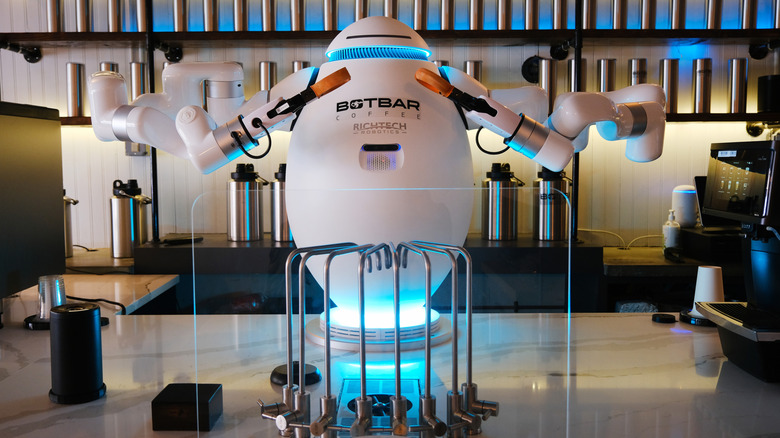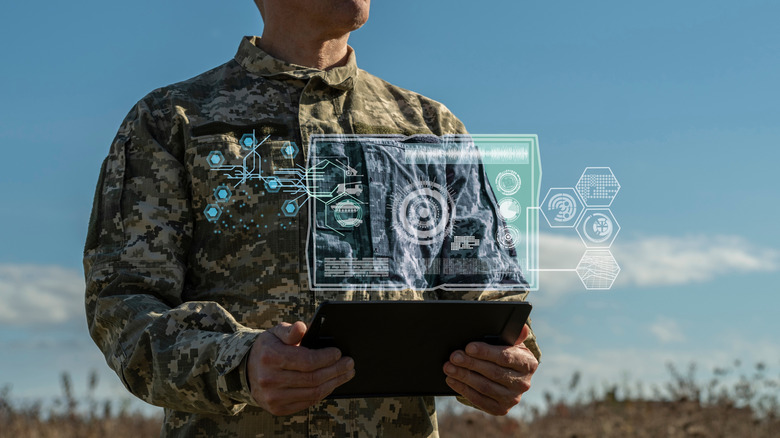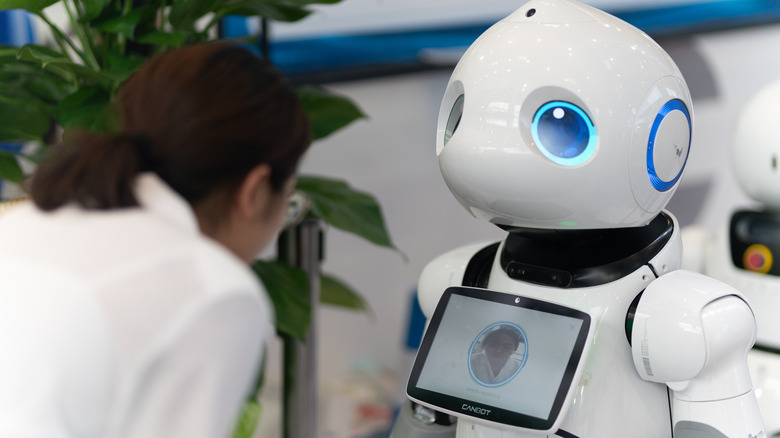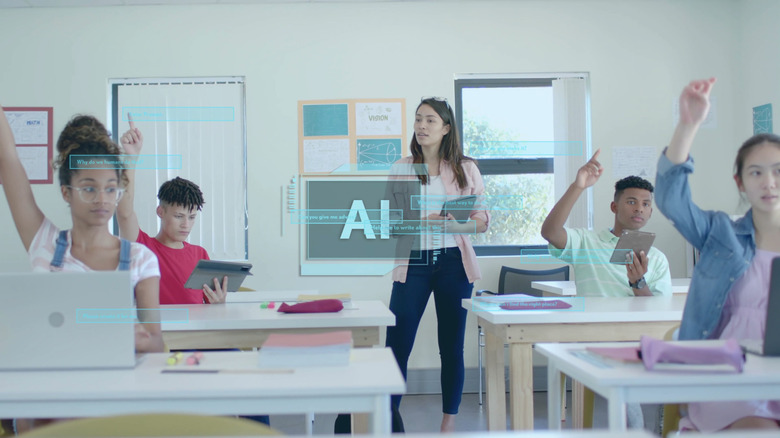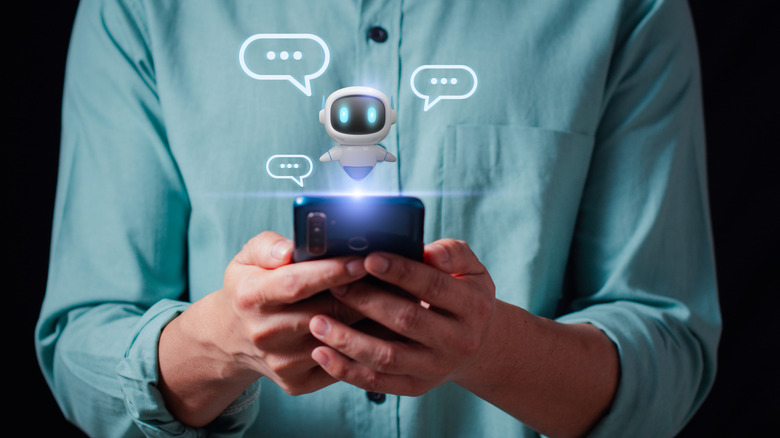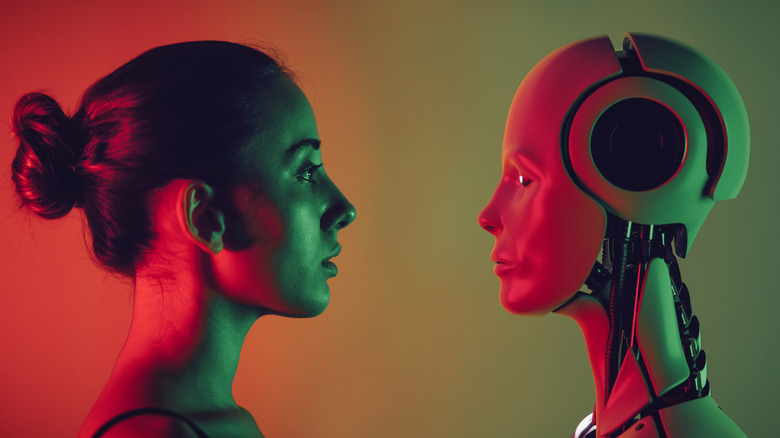What If AI Overtakes Humans?
Artificial intelligence (AI) is arguably the most controversial topic in the realm of technology. While there is debate over whether AI is good or bad, it's also important to first understand the principles of this technology. In a nutshell, AI is credited as the use of computers and other technologies to help perform some of the same functions as human intelligence. To that end, AI can certainly save time and effort in everyday tasks, but it's also worth wondering whether humans' reliance on AI could come at a real cost.
That's not to say that AI does not have its place in human society. In fact, AI does offer benefits in numerous areas, including cybersecurity, environmental resource management, and healthcare. At the same time, some experts are concurrently starting to sound the alarm over the possible negative implications, too. If AI is left unchecked, it is worth wondering how it might overtake humans in a variety of areas of daily life, including employment, governing, and more.
AI could render many human jobs useless
In the short term, perhaps the biggest concerns over the impacts of AI involve human employment. You may have already noticed that AI has a large presence in shopping, healthcare, and customer service sectors, and that you regularly interact with a computer rather than a real person. In fact, there are even robots built to replace humans, although they still work 8-hour shifts. As AI is adapted to other types of jobs and corporations look to slash costs on seemingly unnecessary human employees, this could indeed be a disastrous situation. If AI were to overtake human jobs, this could cause massive unemployment, strained government resources, and subsequent poverty.
Despite the stress of a potential loss of unemployment attributed to AI, some research suggests that this form of superintelligence might have the opposite effect in some sectors. In particular, one 2023 study published in the journal Research in Globalization suggests that AI may actually reduce unemployment in the technology sector because humans are needed to help run the computers that control it. The authors also suggest that job displacement could possibly be a temporary problem, similar to other instances in history where technological advancements in automation replaced certain jobs, such as those in factories. It's impossible to predict exactly how AI can affect the job market, but it may also be worth it for humans to learn new skills to adapt to the changes that the technology might pose.
AI-powered weapons could have unintended consequences
AI is increasingly used in a number of industries, including military activities. In theory, super intelligence can help make militaries safer and more efficient. Overall, the U.S. military has used computers to operate weapons for several decades. They are also constantly exploring nw technologies, such as mind-controlled weapons. There are, however, potential unintended consequences of AI-powered weapons that are not just operated by computers, but created by them as well.
Some of the biggest fears of AI involvement in weapons is the possibility it might lead to more military conflicts around the world, and possibly override human-based decisions in warfare. Even the late Stephen Hawking was concerned about AI-powered weapons. This was a warning from Hawking, who stated that if the benefits of AI were outweighed by the risks, autonomous weaponry created with AI could pose dangers to humanity and even lead to mass oppression. In fact, AI is related to one of the ways Stephen Hawking predicted the world would end. Moving forward, experts warn that it is paramount militaries enact proper oversight when using AI-powered weapons to prevent errors and to help keep all decisions in the control of actual humans.
AI could spawn totalitarian government rule
While there are fears that AI-powered weapons could have larger human consequences without proper oversight, the dangers of AI could possibly go beyond militaries when left unchecked. Such theories center around the danger of AI being used by governments as well as security entities within and outside of the military. The big fear is a possible totalitarian rule with few human rights within a government. Another theory is that AI might inspire a country to try to oppress the rest of the world, which is also known as the "world in chains" theory. Additionally, there's a fear that increased surveillance from citizens' own governments could be put in place with AI and leave humans with very little privacy.
However, the future role of AI in governments isn't so clear-cut. While there are certainly scenarios where the situation could go very wrong, experts have also outlined some scenarios where AI could actually be helpful. The latter theories suggest AI could help keep peace around the world and even help to fight corruption, leading to more stable and secure governments. Overall, the best way to make AI work in favor of humans around the world is to ensure oversight measures are kept in place within governments and between other countries, too.
AI could reduce human critical thinking and decision-making skills
When people consider the possible dangers of AI, they often think about external factors, such as government rule or unchecked military activities. However, it's also worth looking at some of the theories concerning more individual changes, too. Since its mainstream introduction into society, AI has helped people write emails, speeches, and papers, and it even assists with making basic day-to-day decisions. Such impacts on critical thinking and decision-making skills could have long-term consequences for human intelligence overall.
While AI's effects on critical thinking and the ability to make decisions can impact grown adults, an even greater danger might persist among children. In fact, recent research points to this being a problem among school-aged children, and it can continue throughout adulthood. Some of the worst ways AI has affected schools includes an overreliance on the technology for providing answers (and even writing papers), as well as the spread of misinformation. If left unchecked, the fear is that AI's effects on learning and independent thinking could further impact human intelligence. However, as with any evolving technology, AI can still be used in a positive manner to help children learn, so long as it's used in moderation.
Human communication skills could be non-existent
In addition to AI posing reduced critical thinking skills in humans, there are also fears that this could lead to poor communication skills. This stems from an overreliance on AI, particularly its narrative-like capabilities. The theory is that such a reliance on artificial intelligence could reduce the need for real-life human communication. In turn, human communication skills could be hard to come by in the age of AI, and therefore make connections and empathy between humans that much more challenging.
While humans are increasingly relying on AI-driven apps in everyday life, all is not lost. The key, according to experts, is to realize that AI should be used as a complement to human communication, and not in place of it. Getting out and talking with people in real life can help strengthen interpersonal communication skills without allowing superintelligence to take over completely. AI can certainly be helpful with its data collection in some situations, but it cannot replace human-based qualities such as shared experiences and empathy.
Rather than overtaking humans, AI could even turn against them
While the rise in AI is causing concern over super intelligence taking over humanity, there are also hypothetical scenarios of AI turning against humans altogether. In fact, some experts are sounding the alarm over this type of scenario potentially happening within the next several decades, or even sooner. In fact, many other computer scientists are not concerned about the technology itself, but rather the lack of understanding about the inherent risks of AI outweighing potential benefits when left unchecked.
Whether such fears are real, and perhaps seem familiar to people who might recall Skynet in the "Terminator" movie franchise, some researchers are taking the opposite side of this theory. In fact, some researchers point out that AI is not a living being and is inherently controlled by humans, which could render fears of the possibility of AI attacking humans completely unfounded. People on this side of the argument might also point out that technological advancements have long driven fears in human society. The key difference, of course, is that nothing can be compared to AI.
There could be a rise of non-AI communities
Alternatively, while there are fears that AI could overtake humanity, it's also possible that AI could lead to plans of resistance. This could involve the establishment of non-AI communities which might lead more seemingly primitive lifestyles. Similar to perhaps some other types of communities that reject modern living, such as Amish villages, bush dwellers, or global tribes, these groups might inherently decide to actively reject AI and any other technological advances that come with it. While such communities wouldn't physically fight back against AI per se, the idea here is they would actively refuse to participate in any society that involves AI in any way.
There are some theories as to which types of people might join anti-AI communities, especially those who might have fears over what happens after technological singularity. Some experts hypothesize that many of these groups could be religious, and therefore reject the idea of AI as sacrilege. They might also return to more family-centric values. Of course, running away from AI could be easier said than done, particularly in communities that might already be accustomed to using some form of technology. But unlike tribal groups which reject technology of any form, non-AI communities could possibly still enjoy pre-AI technological advances, such as motor vehicles.

